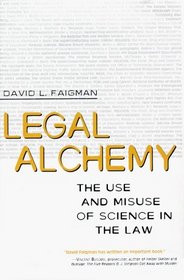Search -
Legal Alchemy: The Use and Misuse of Science in The Law
Legal Alchemy The Use and Misuse of Science in The Law
Author:
Cases involving silicone breast implants, abortion, DNA profiling, handwriting identification analysis, Brown v. Board of Education, global warming, air bags, saccharin wars, the space station, rape trauma syndrome, sport utility vehicles, and many others, have all involved scientific evidence in the American legislative or judicial systems. The... more »
Author:
Cases involving silicone breast implants, abortion, DNA profiling, handwriting identification analysis, Brown v. Board of Education, global warming, air bags, saccharin wars, the space station, rape trauma syndrome, sport utility vehicles, and many others, have all involved scientific evidence in the American legislative or judicial systems. The... more »
ISBN-13: 9780716731436
ISBN-10: 0716731436
Publication Date: 8/15/1999
Pages: 233
Rating: ?
ISBN-10: 0716731436
Publication Date: 8/15/1999
Pages: 233
Rating: ?
0 stars, based on 0 rating
Publisher: St. Martin's Press
Book Type: Hardcover
Other Versions: Paperback
Members Wishing: 0
Reviews: Amazon | Write a Review
Book Type: Hardcover
Other Versions: Paperback
Members Wishing: 0
Reviews: Amazon | Write a Review
Genres:
- Science & Math >> General
- Law >> Legal Theory & Systems >> Science & Technology
- Engineering & Transportation >> Law >> Perspectives on Law >> Science & Technology




